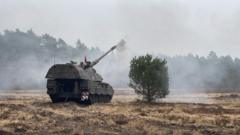A historical pivot towards military readiness signifies a major transformation in Germany's defense posture as concerns about future conflicts escalate.
**Germany's Shift: Embracing Military Strength Amid Rising Threats**

**Germany's Shift: Embracing Military Strength Amid Rising Threats**
Germany prioritizes defense spending as fears of Russian aggression loom.
Germany has embarked on a significant shift in its military strategy, moving from a long-standing pacifism to a renewed focus on military investment amidst fears of Russian expansionism. Recently, the Bundestag approved substantial funding for the Bundeswehr, exempting military spending from strict debt regulations—a decision driven by concerns that Russian aggression may extend well beyond Ukraine. General Carsten Breuer has emphasized the urgent need for this financial boost to deter potential threats from Moscow, drawing attention to the precarious security landscape in Europe.
The renewed emphasis on military preparedness marks a profound change in Germany's traditional stance. Many Germans have grappled with the legacy of their nation’s role in global conflicts, often associating military strength with past atrocities. However, the full-scale invasion of Ukraine has shifted these perceptions significantly. A national pivot in priorities was declared by Chancellor Olaf Scholz in February 2022, committing €100 billion to bolster defense capabilities. Nonetheless, General Breuer insists that this initial funding is insufficient in addressing the Bundeswehr's long-standing deficiencies.
A recent parliamentary report highlighted critical shortages, from ammunition to personnel, underscoring the dire state of readiness. With plans to increase troop levels significantly, Breuer advocates for reinstating conscription to meet military goals, signaling a potential return to mandatory service—a departure from Germany's voluntary military enlistment system established in 2011.
Public attitudes are also shifting. Recent surveys reveal that a majority of Germans now view figures like Putin and even former President Trump as threats to European security. Young citizens express growing support for enhanced military investments, driven by a realization that ensuring national security necessitates a robust defense posture. "We have to adapt," said 18-year-old Charlotte Kreft, reflecting a broader sentiment among her generation.
Amid rising global tensions and an increasingly unpredictable relationship with the United States, Germany's historical reluctance to engage militarily is giving way to a pragmatic approach. The nation's military leadership is actively engaging the public, challenging their willingness to confront emerging threats. As General Breuer aptly puts it, “It's not me scaring you, it’s the other guy!"—a stark reminder of the realities of geopolitical conflict.
As Germany grapples with the impact of these changes, the question remains: is the nation prepared for the responsibilities that come with renewed military strength? The evolving situation will continue to demand a reevaluation of priorities and a commitment to security that alters the course of the nation’s future.
The renewed emphasis on military preparedness marks a profound change in Germany's traditional stance. Many Germans have grappled with the legacy of their nation’s role in global conflicts, often associating military strength with past atrocities. However, the full-scale invasion of Ukraine has shifted these perceptions significantly. A national pivot in priorities was declared by Chancellor Olaf Scholz in February 2022, committing €100 billion to bolster defense capabilities. Nonetheless, General Breuer insists that this initial funding is insufficient in addressing the Bundeswehr's long-standing deficiencies.
A recent parliamentary report highlighted critical shortages, from ammunition to personnel, underscoring the dire state of readiness. With plans to increase troop levels significantly, Breuer advocates for reinstating conscription to meet military goals, signaling a potential return to mandatory service—a departure from Germany's voluntary military enlistment system established in 2011.
Public attitudes are also shifting. Recent surveys reveal that a majority of Germans now view figures like Putin and even former President Trump as threats to European security. Young citizens express growing support for enhanced military investments, driven by a realization that ensuring national security necessitates a robust defense posture. "We have to adapt," said 18-year-old Charlotte Kreft, reflecting a broader sentiment among her generation.
Amid rising global tensions and an increasingly unpredictable relationship with the United States, Germany's historical reluctance to engage militarily is giving way to a pragmatic approach. The nation's military leadership is actively engaging the public, challenging their willingness to confront emerging threats. As General Breuer aptly puts it, “It's not me scaring you, it’s the other guy!"—a stark reminder of the realities of geopolitical conflict.
As Germany grapples with the impact of these changes, the question remains: is the nation prepared for the responsibilities that come with renewed military strength? The evolving situation will continue to demand a reevaluation of priorities and a commitment to security that alters the course of the nation’s future.





















